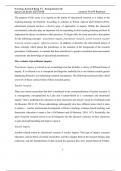Knowing, Acting & Being 711: Acting (Section B)
Jayson-Lee Jansen [22733310] Lecturer: Prof M Robinson
The purpose of this essay is to expand on the notion of educational research as it relates to the
teaching-learning environment. According to scholars in Winch, Oancea and Orchard (2015),
educational research involves a diverse array of approaches to inquiry. Within the classroom
environment, educators play an important role in responding to their teaching-learning and how to
implement the theory in relation to their practices. To begin with, the essay provides a description
for the following concepts - practitioner inquiry, practitioner research, action research, teacher
research, teacher inquiry, reflective practice. In addition, it describes the inter-related nature of
these concepts which places the practitioner or the educator at the foreground of the research
procedures. Furthermore, it contends that there should exist a positive correlation between research
conclusions and knowledge of educational practitioners.
The variants of practitioner inquiry
Practitioner inquiry is viewed as an overarching term that includes a variety of different forms of
inquiry. It is referred to as a conceptual and linguistic umbrella for a vast related research genres
displaying distinctive yet underlying common assumptions. The following section provides a brief
overview of these various forms of these research genres.
Teacher research
There are various researchers that have contributed to the conceptualization of teacher research. It
is consequently conceptualized by Lytle and Cochran-Smith as a “systematic and intentional
inquiry” that is undertaken by educators in their classroom and school” (cited in Al-Ghattami and
Al-Husseini, 2014:147). These undertakings subsequently also have different aims which it aims
to achieve – teacher professional development, reflective teaching, evidence-based teaching, and
democratic education to name a few (Al-Ghattami and Al-Husseini, 2014: 147). Essentially, the
goal of teacher research serves as an investigation into the educator’s practice in their classroom
to gain and understanding and improve upon it.
Teacher inquiry
Another related notion to educational research is teacher inquiry. This type of inquiry concerns
educators, and not those of outside researchers, and this engages them in the research design, data
collection, and the interpretation of data around the question they have posed (Dana & Yendol-
1
, Knowing, Acting & Being 711: Acting (Section B)
Jayson-Lee Jansen [22733310] Lecturer: Prof M Robinson
Hoppey, 2014:6). Teacher inquiry is used as a vehicle to unravel the intricacies that confront the
education profession, provides a platform for educators to have their voices heard in reform and
to transform suppositions about the profession itself (Dana & Yendol-Hoppey, 2014).
Transformation of the profession is seen as the capstone of this educational research endeavour.
Reflective Practice:
Simply put, reflective practice refers to reflecting or the act of ‘looking back’ on one’s actions to
engage in a continuous learning endeavour. According to Finlay (2008), it is “learning through and
from one’s experiences towards gaining new insights of self and practice”. When teachers engage
in such a practice it leads them to better understand how their learners learn best and how to engage
them in the teaching. According to educational researcher, David Kolb, reflective practice is seen
as an instrument to gain conclusions and ideas through experiences (Kolb, 1984).
Action research:
According to Cochran-Smith and Lytle (2001:40), action research purports to “collaboration
among school-based teachers and other educators, university-based colleagues, and sometimes
parents and community activists”. This is, furthermore, described by Elliot (1988) as a continuous
set of spirals that consists out of reflection and action. This sort of research usually has an
emancipatory nature to it.
Teacher research:
The term teacher research refers to the inquiry of established and prospective educators, often in
partnership with university-based colleagues and other educators” (Cochran-Smith and Lytle,
2001:40). These researchers work in communities of inquiry to scrutinizes their own
presuppositions, develop local knowledge through question-posing and data-capturing. These
teacher research works are often in the interests of social justice through inquiry to ensure
“educational opportunity, access, and equity” (Cochran-Smith and Lytle, 2001:40).
Educational Research: The inter-relatedness
Practitioner inquiry is used as an overarching concept for the interrelated play between the
abovementioned notions. These various approaches to practitioner inquiry all places the educator,
within in the classroom, central in the research processes. This notion is maintained by Cochran-
2




